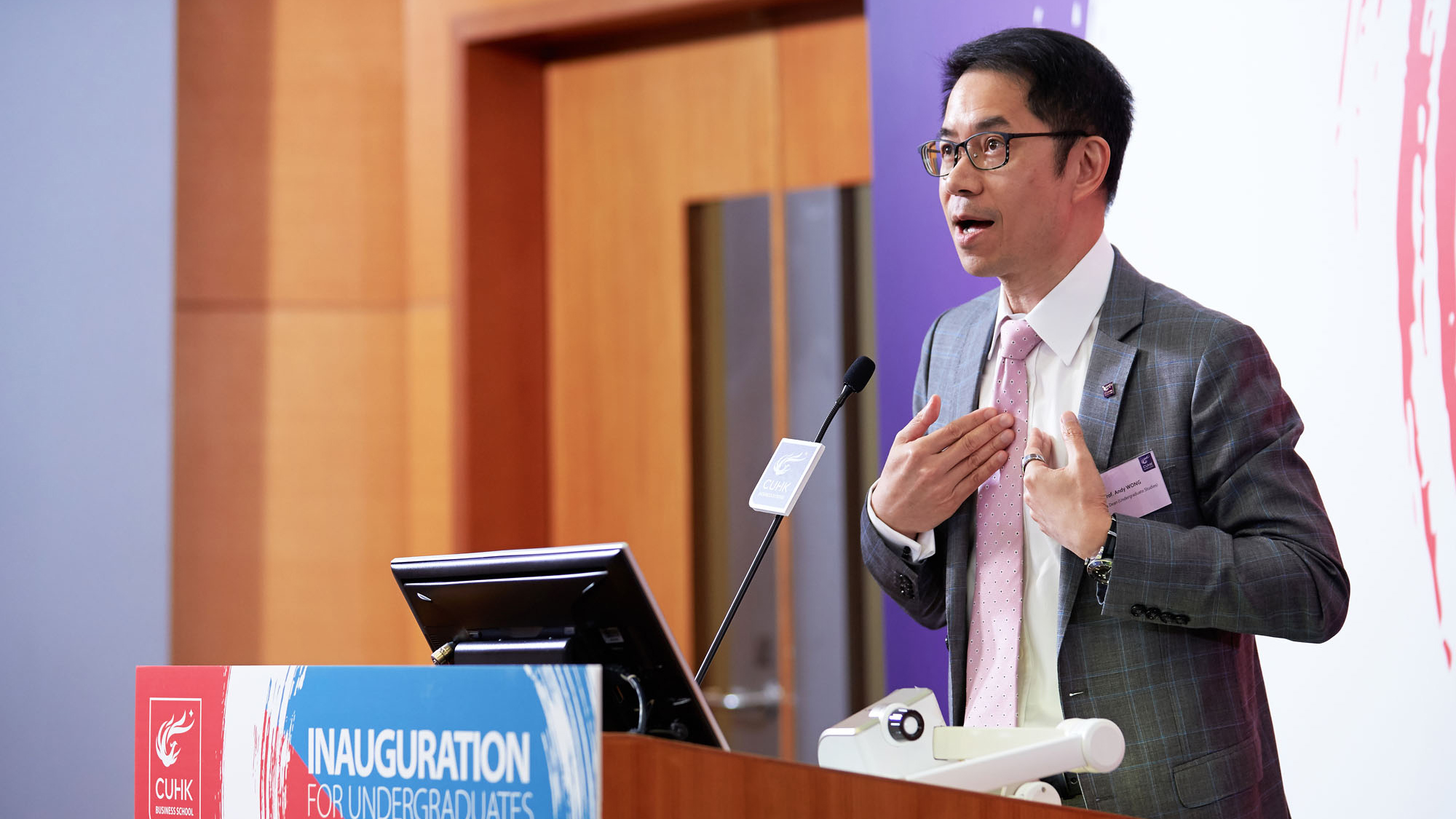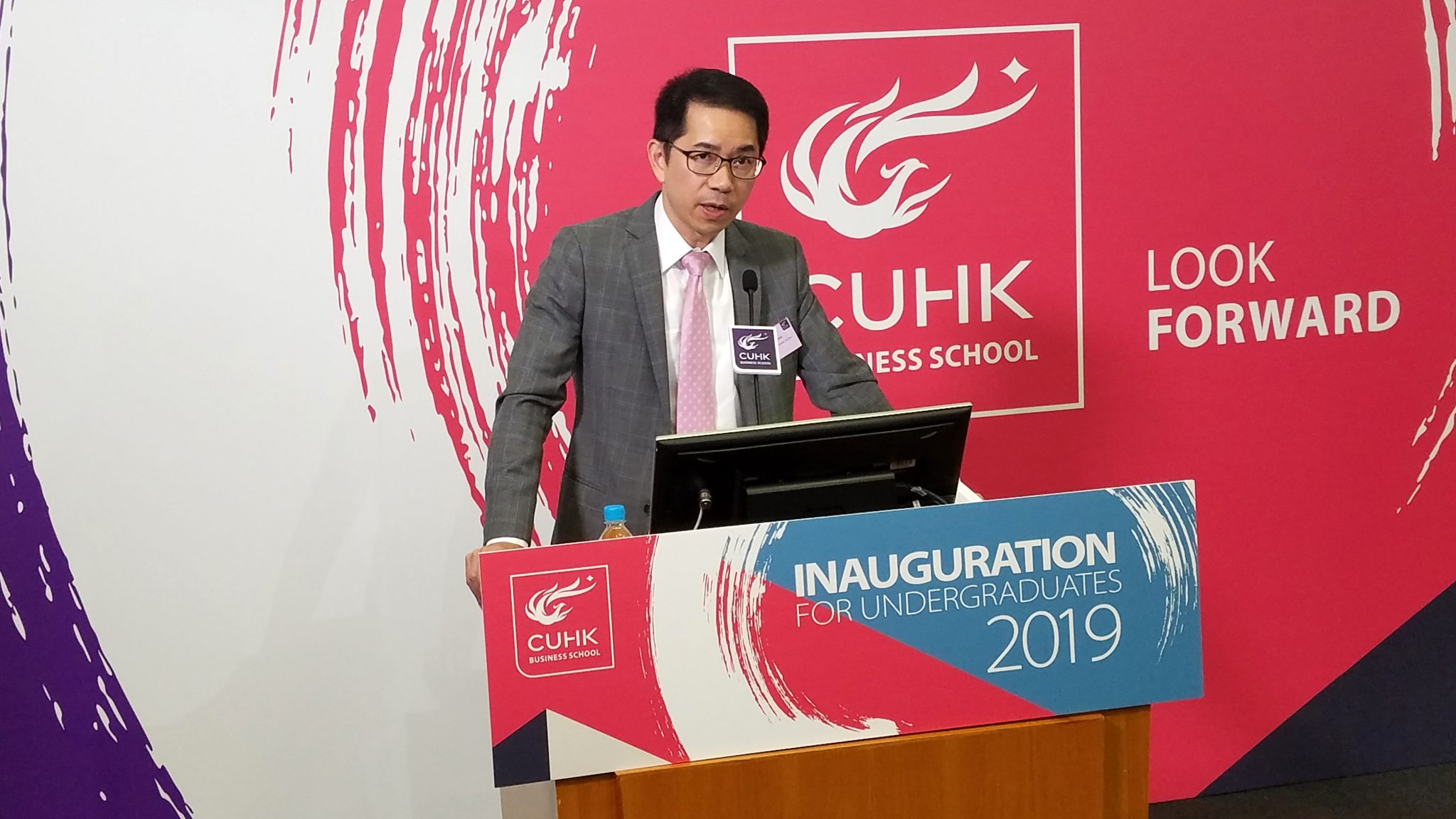Life Lessons Inspire New Students to Stay Strong

Associate Dean of Undergraduate Studies Prof. Andy Wong shares tough life lessons to inspire new students to stay the course and be patient in times of hardship.
In a room filled with more than 400 wide-eyed, high-spirited undergraduates, ready to start a new and important chapter of their life as they embarked on their university journey, Prof. Andy Wong caught them off guard and had them sit at the edge of their seats as he recounted the incredible hardships he has gone through, to show them what it takes to overcome the inevitable problems they will face in the future.
Prof. Wong, Associate Dean (Undergraduate Studies) and Associate Professor of Practice in Marketing at The Chinese University of Hong Kong (CUHK) Business School, described what he was about to share in a closing speech for this year’s undergraduate inauguration ceremony as “very personal, private and scary.”
Many successful people are successful because they give up later than most people when all signs point to one act. — Prof. Andy Wong
Instead of painting an idealised picture of life seen through rose-coloured glasses, Prof. Wong tried to plant the seed of reality in students’ mind right off the bat: “We have problems in Hong Kong, and we have problems in life. Will you have fewer problems in the near future? I’m sorry. You’ll have more as you age. So, what can we do?”
To the students’ surprise, Prof. Wong said he actually felt grateful for having had plenty of problems in his life. “I’m blessed with disproportionally large quantities of problems, so I feel qualified to share with you my experience in dealing with them.”
The first experience he shared was how he got stuck when pursuing his doctoral degree at the University of Southern California. Out of the five years he spent there, he struggled terribly with his dissertation in the final three. Sometimes his experiment data did not support his hypothesis, and the fear of failure constantly crept in.
Don’t tackle your problems alone. Don’t worry about how others see you. Ask for help from someone you can trust. — Prof. Andy Wong
“It’s like one step forward and three steps back. I was discouraged and scared. I would stay in my apartment all day. I didn’t want to see the data I collected the day before, because I didn’t want to face another failure. I would keep myself busy doing other things to distract myself so I would not have to face the reality. I think I was mildly depressed, with some health issues as well.”
When he was about to give a presentation of his final dissertation, he seriously considered quitting and coming back to Hong Kong. Fortunately, he hanged on and sought help from his advisor – a world-class scholar. Part of the reason why he had such a hard time confronting his own work was that he didn’t want to disappoint her. To his surprise, his advisor was extremely supportive and gave him hands-on advice on how to progress. As a result, he was able to hit the finish line.
“It wasn’t pretty, but I am glad I didn’t give up,” he said. “On the brink of giving up, I gave it one more try.”
Prof. Wong shared two lessons he learned from this “near-failure”.
“I think many successful people are successful because they give up later than most people when all signs point to one act, that is, you should quit and not waste any more time.”
 Prof. Andy Wong, Associate Dean (Undergraduate Studies) and Associate Professor of Practice in Marketing, CUHK Business School
Prof. Andy Wong, Associate Dean (Undergraduate Studies) and Associate Professor of Practice in Marketing, CUHK Business School
The second lesson is: Don’t tackle your problems alone. Don’t worry about how others see you. Ask for help from someone you can trust.
The next problem Prof. Wong shared with the students was a problem that seemingly had no solution: He almost died.
About 23 years ago, he was admitted to the hospital after losing sensation in his lower body. Despite performing all sorts of excruciating tests on him, the doctors still could not find the cause. The diagnosis was an unknown autoimmune disease. The doctors told him how lucky he was that he did not die. Unfortunately, he might not be able to walk again.
Things are not as simple as we saw them when we were young. Give people a chance. Give yourself a chance to understand, to get mature and wise. — Prof. Andy Wong
In any case, the doctors believed that some form of exercise like walking would help. So Prof. Wong complied. The first day, he walked 20 steps. Sitting on a wheelchair on the balcony of the hospital, he thought: “Maybe I’d need a wheelchair for the rest of my life.” At this moment, the image of Harrison Ford sitting on a wheelchair in the movie “Regarding Harry” flashed across his mind, and he consoled himself thinking that it might be quite a cool idea.
After being discharged, he started to gradually recover. Miraculously, after six months, he was able to play tennis – his favourite sport – again. Today, Prof. Wong believes he is 99.5 percent recovered.
The lesson he learned from this very scary experience, is when something bad happens, accept it as the “new normal”. This doesn’t mean that one should lose hope. Instead, he encouraged the students: “Be positive. Hope for the best. And then focus on incremental progress. Sometimes, you may not be able to fix your problems all at once. Do it patiently, step by step. Maybe today you can only walk only 25 steps. Maybe tomorrow, you can walk 30 steps; and the next day, 35. As of today, after 23 years, I can, fortunately, walk again, and I even run marathons. As an ex-AID (Autoimmune Disease) patient, it’s not too bad.”
The third experience Prof. Wong shared was extremely personal. He told the story of how he grew up in an unhappy family, where his parents would constantly fight and he would cry himself to bed every single night. As a young child, he resented his father for all the unhappiness he had caused his family. When he was in F.4, his parents finally divorced. At that point, he felt calm and accepted that it was not a problem he could fix.
Some problems are like a disease. They happen, but don’t blame yourself or others. Try to fix the problems step by step. — Prof. Andy Wong
Instead of turning into a rebellious teenager and having thoughts of revenge, he decided to study hard, because he believed that was the way for him to create his own life and future. He felt lucky to have gotten the opportunity to study at CUHK Business School, as it turned out to be a “life-changing experience” for him.
Here is the important lesson he learned from his unhappy family life: “Some problems are like a disease. They happen, but don’t blame yourself or others. Try to fix the problems step by step. What I’ve learned was, I wanted to build rather than destroy. I wanted to forgive, rather than retaliate. It’s really hard, but after all these years, as I get older and maybe a little wiser, I know that things are not as simple as we saw them when we were young. Give people a chance. Give yourself a chance to understand, to get mature and wise. Be positive and constructive. Don’t try to fix problems all at once. Give it time, patience and effort.”
Having talked about his own problems and how he resolved them, Prof. Wong turned to the problems that young students are facing today and addressed them head-on with an invitation:
“Right now, we have mixed feelings in Hong Kong. I know that you are happy about new beginnings, yet you worry for the city you love. Let’s have mixed feelings together, shall we?”
He acknowledged that the students might feel wounded in the past, just as it might feel like Hong Kong has been wounded. “But let’s be patient,” he said. “Time heals everything. Time heals all wounds. Be smart, equip yourself, be intelligent. Learn how to tell the right from the wrong, what is true and what is false.”
Stand up for the society. Try not to be overly emotional. Be calm. Let’s figure out the solutions together. — Prof. Andy Wong
Prof. Wong’s last words of advice were: “Be strong. We need people like you, who are smart, responsible and strong. You can withstand all these challenges out there. I respect all of you for your commitment to Hong Kong. Stand up for the society. Try not to be overly emotional. Be calm. Let’s figure out the solutions together. One of the missions of our school is to train people who don’t blame, who don’t destroy, who provide solutions and fix problems. Let’s do it together!”
By Louisa Wah

